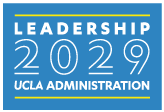Management Topic: Emotional Intelligence
Dear Colleagues,
In the past few years, as mental health has taken prominence in the media and our culture, the idea of Emotional Intelligence has come forward as an essential tool for leaders. Although we typically consider “leaders” to be those who work in an environment where they supervise employees, the broader concept of leadership can be applied to everything from work to relationships, especially when it comes to staying in check with our own emotion and the emotions of those around us, and the general well-being of our society.
Recently, the UCLA Staff & Faculty Counseling Center under the leadership of Jorge Cherbosque, PhD, and Nan Levine-Mann, LCSW, developed a document titled Manager’s Toolkit III, Leading During Challenging and Uncertain Times: Creating a Culture of Motivation and Breakthrough Performance opens a new window. This toolkit focuses on emotional intelligence through leadership and is a wonderful tool in developing essential skills for all leaders and creating mental balance. Below are some highlights:
Essential Skills
The toolkit is broken down into five essential skills of emotionally intelligent leaders.
- Psychological Safety Skills - the ability to create an environment of trust and non-judgmental acceptance. The focus of this section is developing an environment of trust, allowing team members to problem solve, learn from mistakes, and feel free to collaborate to accomplish common goals.
- Calming Skills - focusing on self-governance and dealing with adversity. Be sure to spend extra time in this section as there are lots of practical techniques and additional resources for releasing stress and creating a personal place of peace.
- Connecting Skills - establishing and maintaining a personal connection with your employees. We have an intrinsic need to feel connected with the people in our lives. This section offers tips on staying connected, especially in our current environment of remote-work. It also addresses creating an environment of inclusivity.
- Self-Efficacy Skills - developing a sense of empowerment to allow your employees the opportunity to develop confidence and grow. Included in this section are The Nine Accomplice Saboteurs that make up a set of habitual thought processes that prevent us from achieving our fullest potential.
- Resilience and Hope Skills - developing optimism and a belief that one can prevail in spite of challenges and obstacles. This section explores the idea of optimism and its role in dealing with hardship and compelling us to make better choices.
Quizzes
Some sections include self-check quizzes to help you identify areas for improvement and to help draw awareness of behaviors that may be creating barriers between you and your employees.
Additional Resources
The toolkit seeks to introduce the five essential skills of emotional intelligence. If you find yourself wanting more information on any or all of the skills, resources are provided to allow for a deeper dive into the subject.
Learn More About This Topic
Many additional resources are embedded in the Toolkit. Click on the link above to begin exploring!
- Feel the Fear and Do it Anyway (book) by Susan Jeffers
- Feeling Good: The New Mood Therapy (book) by David Burns
- The Miracle Morning: The Not-So-Obvious Secret Guaranteed to Transform Your Life (Before 8AM) (book) by Hal Elrod
Interested in reviewing prior months’ topics? Visit our Monthly Management Tips website.
Stay Safe!

Do you have feedback, questions or a suggested topic you would like to learn more about? Please email: managementtips@ucla.edu(link sends email).
Want to receive Monthly Management Tips emails? Sign up for our list! opens a new window

